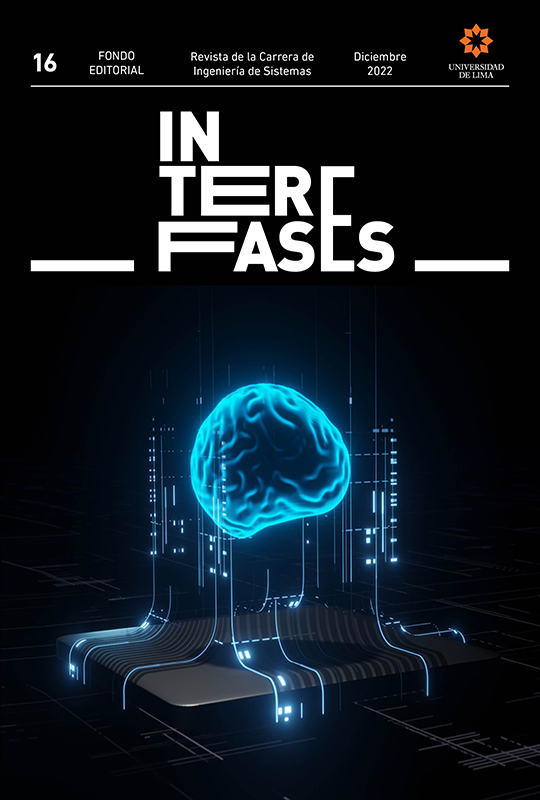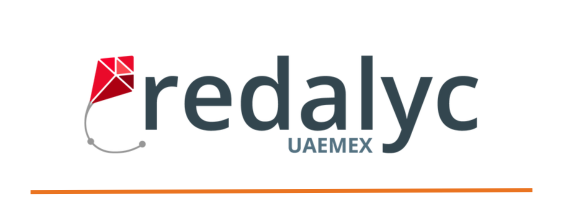Capital humano: la clave de la gestión del conocimiento en las organizaciones públicas. Un enfoque integrador
DOI:
https://doi.org/10.26439/interfases2022.n016.6121Palabras clave:
gestão do conhecimento, compartilhamento do conhecimento, setor público, pessoas, capital humanoResumen
Este artículo indaga sobre cómo la investigación académica aborda la relación entre el capital humano, la gestión del conocimiento y el sector público. Para ello, se realizó una revisión integradora con términos clave relacionados con los tres temas mencionados y realizada con datos importados de la base de datos Scopus. Entre los resultados alcanzados, se identificaron seis clústeres de abordaje temático. Luego del análisis, fue posible identificar cómo los recursos humanos contribuyen a la gestión del conocimiento en el sector público y las consecuencias para las personas, derivadas de su implementación. Este artículo contribuye a la investigación sobre la importancia de las personas en la gestión del conocimiento en las organizaciones públicas, promoviendo la síntesis de los estudios más recientes sobre el tema.
Descargas
Referencias
Almudallal, A. W., Bakri, N., Muktar, S. N., & El-Farra, M. M. (2016). Implementing knowledge management in the palestinian public sector institutions: empirical study on the Presidency of the Palestinian Government. International Review of Management and Marketing, 6(4), 101-107.
Amayah, A. T. (2013). Determinants of knowledge sharing in a public sector organization. Journal of knowledge management, 17(3), 454-471.
Alavi, Maryam; & Leidner, Dorothy E. (2001). Knowledge management and knowledge management systems: Conceptual foundations and research issues. MIS quarterly, 25(1), 107-136.
Araújo, C. (2006) Bibliometria: evolução histórica e questões atuais. Em questão, 12(1), 11-3.
Bakar, A., Rahim, N. Z. A., & Ibrahim, R. (2015, August). Measurement Model of Relationship Between Knowledge Management Enablers and Knowledge Management Performance in Public Sector [tipo de apresentação] International Conference on Knowledge Management in Organizations, Springer, Cham. Site do artigo.
De Normalisation, C. E., & Normung, E. K. F. (2004, March). European Guide to good Practice in Knowledge Management-Part 5: KM Terminology. In: CEN Workshop Agreement CWA (pp. 14924-1).
Baporikar, N. (2017). Knowledge Management for Excellence in Indian Public Sector. International Journal of Social Ecology and Sustainable Development, 8(1), 49-65.
Bell DeTienne, K., Dyer, G., Hoopes, C., & Harris, S. (2004). Toward a model of effective knowledge management and directions for future research: Culture, leadership, and CKOs. Journal of leadership & organizational studies, 10(4), 26-43.
Bertolino, A., De Angelis, G., Polini, A., Re, B., & Sergiacomi, A. (2020). Process-oriented knowledge management and learning in public administrations. Electronic Government, an International Journal, 16(4), 441-465.
Boateng, H., & Agyemang, F. G. (2015). The role of culture in knowledge sharing in a public-sector organization in Ghana: Revisiting Hofstede’s model. International Journal of Public Administration, 38(7), 486-495.
Botelho, L. L. R.; Cunha, C. C. A.; Macedo, M. (2011). O método da revisão integrativa nos estudos organizacionais. Gestão e Sociedade, 5(11), 121-136.
Castaneda, D. I., Rios, M. F., & Duran, W. F. (2016). Determinants of knowledge-sharing intention and knowledge-sharing behavior in a public organization. Knowledge Management & E-Learning: An International Journal, 8(2), 372-386.
Castaneda, DI, Pardo, C., & Toulson, P. (2015). Validação de instrumento de compartilhamento de conhecimento espanhol. Revista Eletrônica de Gestão do Conhecimento, 13(1), 3-12.
Castaneda, D.I, & Toulson, P. (2013). O valor da mensuração de recursos humanos no capital intelectual e no compartilhamento de conhecimento. Electronic Journal of Knowledge Management, 11(3), 226-234.
Cooper, Paul. (2017). Data, information, knowledge and wisdom. Anaesthesia & Intensive Care Medicine, 18(1), p. 55-56.
Creswell, J. W. (2010). Projeto de pesquisa: Métodos qualitativo, quantitativo e misto (3.ª ed.). Artmed.
Cummings, J.L., & Teng, B.S. (2003). Transferência de conhecimento RandD: Os principais fatores que afetam o sucesso da transferência de conhecimento. Journal of Engineering and Technology Management, 20(1), 39-68.
Dalkir, K. (2013). Knowledge management in theory and practice. Routledge.
Da Silva, J. C., Charrua-Santos, F. B., Franco, M., Santos, K. F., Garcez, A. P. B., Moreira, J. A., & da Silva, R. M. (2021, November). The Needs of the future society 5.0: A challenge. In Proceedings of ICERI 2021 Conference (Vol. 8, p. 9th).
De Angelis, C. T. (2016). The impact of national culture and knowledge management on governmental intelligence. Journal of Modelling in Management, 11(1), 240-268.
Dey, T., & Mukhopadhyay, S. (2018). Linkage between contextual factors, knowledge‐sharing mediums, and behaviour: Moderating effect of knowledge‐sharing intentions. Knowledge and Process Management, 25(1), 31-40.
Dewah, P., & Mutula, S. M. (2016). Knowledge retention strategies in public sector organizations: Current status in sub-Saharan Africa. Information Development, 32(3), 362-376.
Fischer, C., & Döring, M. (2021). Thank you for sharing! How knowledge sharing and information availability affect public employees’ job satisfaction. International Journal of Public Sector Management, 35(1), 76-93.
Ganapathy, S., Mansor, Z., & Ahmad, K. (2019). Investigating Factors Affecting Knowledge Management Practices in Public Sectors. International Journal of Advanced Computer Science and Applications, 10(11), 205-212.
Gruzman, C., & Siqueira, V. H. F. (2007). O papel educacional do Museu de Ciências: desafios e transformações conceituais. Revista Electrónica de Enseñanza de las Ciencias, 6(2), p. 402-423.
Hofstede, G. (1980). Culture’s consequences. Beverly Hills: Sage Publications. Revista de Gestão Estratégica, 21, 473-49.
Koskien, K. U. (2013). Business organizations’ knowledge-production processes: an autopoietic approach. International Journal of Organizational Analysis, 21(2), 137-153.
Lartey, P. Y., Kong, Y., Afriyie, S. O., Santosh, R. J., & Bah, F. B. M. (2021). Knowledge management issues in India: A public sector perspective. International Journal of Public Administration, 44(3), 215-230.
Martinsons, M. G., Davison, R. M., & Huang, Q. (2017). Strategic knowledge management failures in small professional service firms in China. International Journal of Information Management, 37(4), 327–338.
May, B. L., & Fombad, M. (2019). Knowledge sharing at the overstrand municipality in Western Cape Hermanus, South Africa. Libri, 69(4), 325-336.
Moreira, F. K.; Freire, P.S & Souza, J.A. (2022). Governança Multinivel Publica; um novo modelo para a Governança Multinivel Pública Brasileira. Editora CRV.
Massaro, M., Dumay, J. & Garlatti, A. (2015). Gestão do conhecimento do setor público: uma revisão estruturada da literatura. Journal of Knowledge Management, 19(3), 530-558.
Muqadas, F., Rehman, M., & Aslam, U. (2017). Exploring the challenges, trends and issues for knowledge sharing: A study on employees in public sector universities. VINE Journal of Information and Knowledge Management Systems, 47(1), 2-15.
Nair, P., & Prakash, K. (2009). Knowledge Management: facilitator’s guide. In: Asian Productivity Organization. Knowledge Management: facilitator’s guide. Tokyo: APO, 105-209.
Ncoyini, S. S., & Cilliers, L. (2020). Factors that influence knowledge management systems to improve knowledge transfer in local government: A case study of Buffalo City Metropolitan Municipality, Eastern Cape, South Africa. SA Journal of Human Resource Management, 18(1), 1-11.
Neves, J. A. B. (2018). Modelo de equações estruturais: uma introdução aplicada. Disponível em http://repositorio.enap.gov.br/handle/1/3334.
Neves, M. L. C., Rados, G. J. V., & Fialho, F. A. P. (2018). Pessoas, processos e tecnologia na gestão do conhecimento: uma revisão da literatura. Ciências da Administração, 20(51), 153-167.
Nonaka, I., & Takeuchi, H. (1997). Criação de Conhecimento na Empresa. Campus.
Organização para a Cooperação e Desenvolvimento Econômico, (2007). Orçamento de desempenho nos países da OCDE. OCDE
Polanyi, Michel. (1967). The Tacit Dimension. Roudtledge & Kegan Paul.
Pandey, S. C., & Dutta, A. (2015). Knowledge infrastructure capabilities and knowledge management: case of an Indian public sector undertaking. International Journal of Knowledge-Based Development, 6(1), 50-64.
Pee, L. G., & Kankanhalli, A. (2016). Interactions among factors influencing knowledge management in public-sector organizations: A resource-based view. Government Information Quarterly, 33(1), 188-199.
Probst, G.; Raub, S.& Romhardt, K. (2002). Gestão do conhecimento: os elementos construtivos do sucesso. Porto Alegre: Bookamn.
Razzaq, S., Shujahat, M., Hussain, S., Nawaz, F., Wang, M., Ali, M., & Tehseen, S. (2018). Knowledge management, organizational commitment and knowledge-worker performance: The neglected role of knowledge management in the public sector. Business process management journal, 25(5), 923-947.
Salleh, K. (2013). Knowledge sharing and knowledge management modelling in public sector accounting organisation: case evidence from Malaysia. International Journal of Knowledge-Based Development, 4(4), 363-381.
Santos, R. N. M. D. & Kobashi, N. Y. (2009). Bibliometria, cientometria, infometria: conceitos e aplicações. Tendências da Pesquisa Brasileira em Ciência da Informação, 2(1), 155- 172.
Santos, N., & Varvakis, G. (2021). O que é Gestão do Conhecimento? [Material de apoio de aula online]. Programa de Pós-Graduação em Engenharia e Gestão do Conhecimento, Universidade Federal de Santa Catarina, Florianópolis, Santa Catarina.
Serenko, A., & Bontis, N. (2013). Global ranking of knowledge management and intellectual capital academic journals: 2013 update. Journal of Knowledge Management, 13(2), 4-15.
Storey, J., & Barnett, E. (2002). Iniciativas de gestão do conhecimento: aprendendo com falha. Journal of Knowledge Management, 4(2), 145-156.
Stewart, T. A. (1998). Capital Intelectual. A nova vantagem competitiva das empresas (10.ª ed.). Rio de Janeiro: Campus.
Taskin, L., & Van Bunnen, G. (2015). Knowledge management through the development of knowledge repositories: towards work degradation. New Technology, Work and Employment, 30(2), 158-172.
Torraco, Richard J. (2005). Writing integrative literature reviews: Guidelines and examples. Human resource development review, 4(3), 356-367.
Torre, C., Tommasetti, A., & Maione, G. (2020). Technology usage, intellectual capital, firm performance and employee satisfaction: the accountants’ idea. The TQM Journal, 33(3), 545-567.
Tripathi, D., Priyadarshi, P., Kumar, P., & Kumar, S. (2020). Does servant leadership affect work role performance via knowledge sharing and psychological empowerment? VINE Journal of Information and Knowledge Management Systems, 51(5), 792-812.
Tsirikas, A. N., & Katsaros, K. K. (2014). Linking knowledge management, job satisfaction and productivity in the Greek public sector. International Journal of Knowledge Management Studies, 5(3-4), 244-264.
Teng, BS (2006). As chaves para o compartilhamento de conhecimento bem-sucedido. Journal of General Management, 31(4), 1.
Wang, P., Zhu, F. W., Song, H. Y., Hou, J. H., & Zhang, J. L. (2018). Visualizing the academic discipline of knowledge management. Sustainability, 10(3), 682.
Whittemore, R. & Knafl, K. (2005). The integrative review: updated methodology. Journal of advanced nursing, 52(5), 546-553.
Willem, A. & Buelens, M. (2006), Compartilhamento de Conhecimento em Organizações do Setor Público. O efeito das características organizacionais no compartilhamento de conhecimento interdepartamental. Journal of Public Administration Research and Theory, 17(4), 581-606.
Wiig, K. M. (1997). Integrating intellectual capital and knowledge management. Long range planning, 30(3), 399-405.
Publicado
Número
Sección
Licencia
Los autores/as que publiquen en esta revista aceptan las siguientes condiciones:
Los autores/as conservan los derechos de autor y ceden a la revista el derecho de la primera publicación, con el trabajo registrado con la licencia de atribución de Creative Commons, que permite a terceros utilizar lo publicado siempre que mencionen la autoría del trabajo y a la primera publicación en esta revista.
Los autores/as pueden realizar otros acuerdos contractuales independientes y adicionales para la distribución no exclusiva de la versión del artículo publicado en esta revista (p. ej., incluirlo en un repositorio institucional o publicarlo en un libro) siempre que indiquen claramente que el trabajo se publicó por primera vez en esta revista.
Se permite y recomienda a los autores/as a publicar su trabajo en Internet (por ejemplo en páginas institucionales o personales) antes y durante el proceso de revisión y publicación, ya que puede conducir a intercambios productivos y a una mayor y más rápida difusión del trabajo publicado (vea The Effect of Open Access).
Última actualización: 03/05/21






